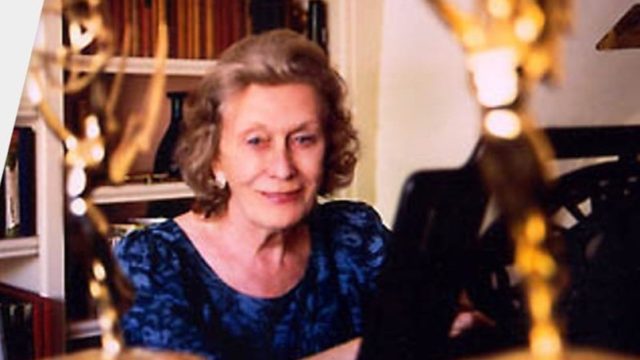It’s not terribly surprising that the first few people to transition while working in the industry were behind-the-scenes. Oh, the Wachowskis were prominent either way, but they also had some of the way cleared for them by Wendy Carlos and Angela Morley. (If I get to them, I’ll be writing them up as a single entity, the way I did the Coens; I will not be covering Elliott Page any time soon for the excellent reason that he is more than ten years younger than I am and therefore more than five years too young for the column. Aren’t you all glad that standard kept Ezra Miller out last year?) As far back as 1972, Angela Morley transitioned and kept working; both her Oscar nominations came after she started living as Angela.
Really, the most interesting thing about Angela Morley is how much she was self-taught. She started taking piano lessons at age eight, but her father died right around the same time, and reading between the lines of her Wikipedia entry shows us a family thrown into disarray. It was 1933. The page doesn’t specifically mention siblings but does say “family.” They moved almost immediately after, and she was no longer able to take music lessons. She still managed to learn at least four instruments and is only mentioned as having taken lessons on one. This is clearly a child for whom music was a vital passion, a child who’d discovered the great love of their life and kept at it despite adversity.
It was also, honestly a child born in an era where you’d have a group called “Archie’s Juvenile Band,” where said child could drop out of school and tour. Okay, sure, that’s at age fifteen. It’s still incredible to think about a tour of teenagers, considering the group isn’t itself prominent enough to have a Wikipedia page. This is just another touring band in the ‘30s. There were scads of them. And within two years, Morley was arranging music for them as another source of income. Her early childhood love of dance music drove her in directions other children her age wouldn’t go.
Writing dance music shifted into working on the radio; Morley worked on The Goon Show for years, while at the same time musical director for the British section of Philips Records. The latter helped her meet Shirley Bassey and Noël Coward (yes, we’ll be getting to him at some point), and may be why she ended up arranging and orchestrating to Eurovision Song Contest entries. Her work also led to her composing and possibly performing the percussion music for the film Peeping Tom. She would go on to work on any number of films and TV shows, often as an orchestrator but sometimes as a composer; we are frankly all lucky that she was introduced to John Williams at some point.
She was married twice; her first wife died in 1968. In 1970, she married Christine Parker, whom she credited as giving her the strength to start living as a woman. She was grateful for Parker’s help with the process, and they remained married until Morley’s death in 2009. When Ed Sikov wrote a biography of Morley’s old Goon Show colleague Peter Sellers, he asked Morley how she should be referred to for her work in those days, and she told him he’d have to make that decision. Tradition therefore holds that her pre-transition work is credited to Wally Stott still; she never seems to have expressed a preference that it shouldn’t be.
Help pay for the music lessons my son’s probably getting starting in September; consider supporting my Patreon or Ko-fi!

